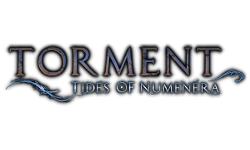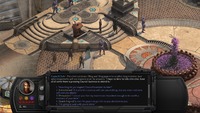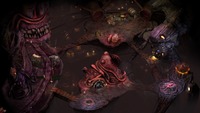|
|

|
PLATFORM
|
PC
|
BATTLE SYSTEM
|

|
INTERACTION
|

|
ORIGINALITY
|

|
STORY
|

|
MUSIC & SOUND
|

|
VISUALS
|

|
CHALLENGE
|
Adjustable
|
COMPLETION TIME
|
20-40 Hours
|
|
OVERALL

|
+ Unique Setting
+ Good Use of Out-of-Combat Skills
+ Intriguing Companion Characters
- So Much Reading
- Lack of Flexibility in Later Chapters
- Lack of Voice Over
|
Click here for scoring definitions
|
|
|
No one can step into the same river twice, a spiritual successor can never be that game again, and Planescape: Torment's fanbase will never be happy. Torment: Tides of Numenera is stuck with an unenviable task of breaking all of the above aphorisms in half. The fan-funded follow up from Monte Cook and InXile Entertainment takes RPGamers to the Ninth World of Numenera, a strange setting of fallen sci-fi and post-apocalyptic fantasy, putting player's into the shoes of the most recent mortal vessel of a being called "The Changing God." This so-called god is a master of the technological relics of the world who shuffles forms in a mysterious quest, and trying to figure out what the devil everything means and why an inexorable creature of fire and darkness that want her and and all of the other former vessels dead. Extensive dialogues ensue.
The story is light on plot and heavy on lore. The mystery of what the Changing God wants and how to make the powerful, formless, black monstrosity called The Sorrow stop killing all your siblings is mostly a matter of a following breadcrumbs towards the right people until the player discovers the flashback machine that plays the last bits of the story and then make the final decision. Literally, it's a breadcrumb trail from one source of exposition that clears one plot wall and leads to another. In the meantime there's a lot of tangential dealing other people's mundane problems in a setting composed entirely of esoteric bizarreness, but even that tends to boil down to the same game of chase the dialogue prompts. It's weird to talk about reading mere game text as a grind, but clicking through novels-worth of text wears on the patience almost the same way as dozens of hours of samey combat other games offer.
I once claimed that the original Planescape: Torment suffered for being tied to Advanced Dungeons & Dragonís combat mechanics, with almost no combat required. In that case, sufficient statistics in Charisma, Intelligence, or Wisdom led to a dialogue prompt that progressed the story non-violently. Tides finally rectifies this issue by assigning a point pool to each stat. Players must wager these points when trying to use a dialogue skill check. More points means more likely success, but these points don't refresh that often and they are used in combat as well for special abilities or putting little more emphasis on a hit. Combat encounters are few and far between, with each one having its own wrinkles; like a device that spawns mooks or a crazy pillar of fire moving around the field sending burning zones across the map to make it feel different from the last fight. Otherwise, the fights ought to be familiar to anyone whoís played an Infinity Engine game; each combatant takes their turn moves (or a special action classed as move-equivalent) and an attack or special ability use. The abilities are fairly by-the-numbers attacks, buffs, and debuffs. Itís a welcome break from the endless scroll of text and handily displays a modern take on an old-school gameplay style.
 Even Cast-Off Dieties Must Confront Red-Tape.
Even Cast-Off Dieties Must Confront Red-Tape.
|
|
The setting of Numenera the tabletop RPG is well- realized on the screen. The material is strange all the way down and the art department keeps pace with it oddity for oddity with gusto. Even in isometric 2D view, everything looks great and specific. There are text descriptions available for every major background elements as well, if not an interactive object. There are options to really deep dive into the material, including a skill that unlocks even more backstory from objects, if the player isnít tired of reading yet.
As much as the game is about the main character and her various past incarnations, there is a robust supporting cast. It's a shame that the story locks them away after the first act. Once the player leaves the starting zone they are stuck with that party. The characters have intriguing backstories that show off more of the strangeness of Numenera's world, but that hard lock on a crew provides a bit of frustration for any player looking to see as much as possible in one playthrough. Part of that irritation is that not all party members are created equal. Players can team up with arcane researchers, a master assassin, a shepherd possessed by the esoteric forces of adventure (the narrative concept), a compulsive rogue, and a little girl — nothing special about her, just a child with skills, abilities, and hindrances to be expected of a child, she will emotionally manipulate the player into not dismissing her from the party and you will have to finish the game with this pre-pubescent albatross hanging from your neck. Good luck!
Engaging with the backstories of these characters does result in an interesting story with a side quest component. That element is ultimately a reflection of the main game of poking things for exposition, throwing skill points at a problem to unlock more exposition and then finally revealing the full story with enough poking, but each one is more complete and satisfying than the main game proper, even the little girl.
 Third Left After the Collapsed Maw and into the Junkyard Space Warp.
Third Left After the Collapsed Maw and into the Junkyard Space Warp.
|
|
An ongoing issue with the game is that the dialogue lacks personality. It's not just that so few of the lines are voiced, or that so much of it is long blocks of setting and backstory information rather than characterization, but the little character portrait next to the dialogue window that is the format of these games is almost always the player character's, not the conversation partner. Itís easy for gamers to lose track of what conversation they are meant to be having and with whom, so they get caught in a cycle of poking every prompt until a conversation action they still have points for just to progress.
In terms of soundtrack, Numenera doesn't have too many terms to actually go over. There arenít many tracks to this game, they aren't bad — but they all fall into that electro meets quasi-middle eastern vibe that has already become weirdly common in sci-fi television. It doesn't quite sync up with how well the visuals of the setting have been realized by the game. For all that, players can see and read in Torment, there's very little to entertain and entice the ears.
The original Planescape: Torment cast the player in the lead role of an ontological and metaphysical mystery about what can change the nature of an individual that used in an obfuscated character backstory to generate tension and interest toward a climax that was forged by the course of an entire game. What Tides of Numenera offers is a rich experience in learning lore and then making a final multiple guess at the ending, all the while never being fully satisfying in terms of presentation. There's more playability to this take on this game, but it might be better off being used for a title that has far less baggage.
Review Archives
|









